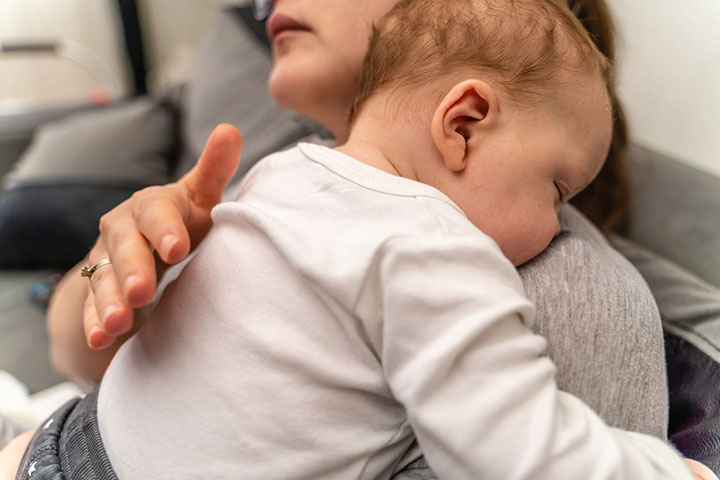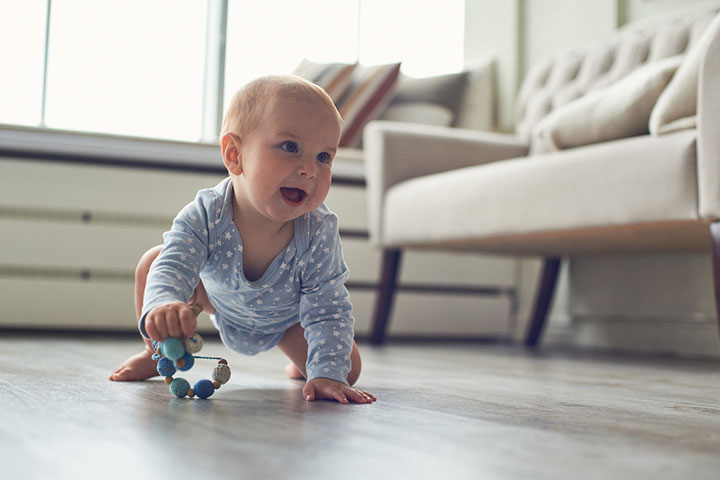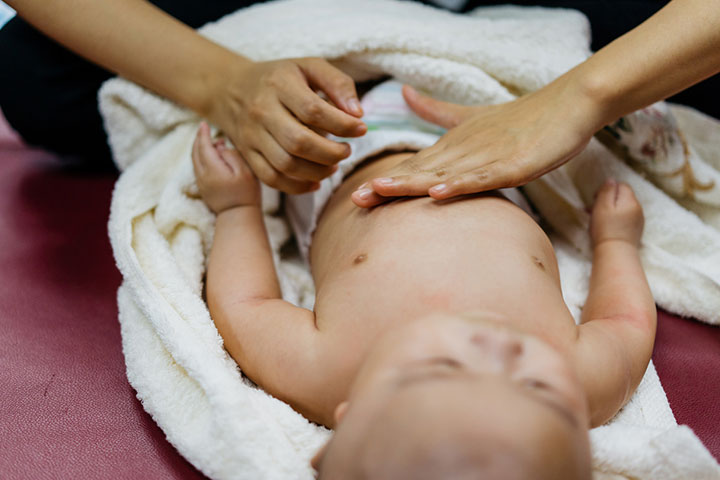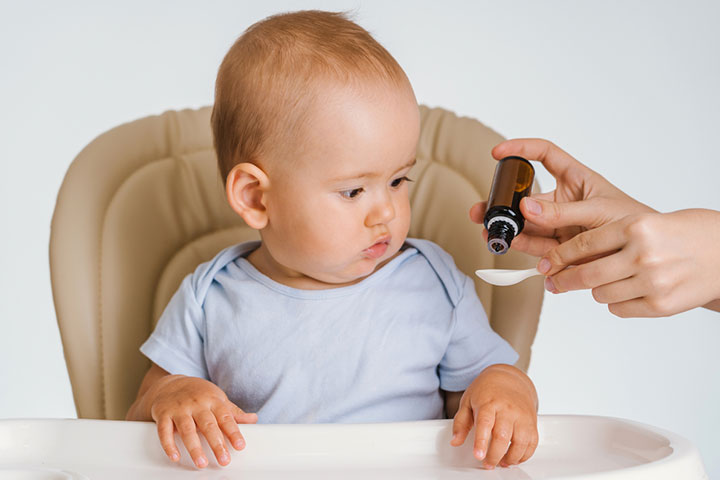When do you stop burping a baby? New parents may often wonder about it. Burping is a part of your baby’s feeding regimen to assist your baby to release the excess gas from the tummy that they tend to ingest while feeding (1). It is believed to assist your child to avoid spitting up and relieving gastrointestinal discomfort, such as colic, caused by trapped gas.
Read on to learn more about when to stop burping a baby, indications to watch for to make an informed decision, and other alternative ways of help.
When Can You Stop Burping The Baby?
Most infants usually do not need burping by the age of four to six months (2).However, every baby is different, and so is the rate at which their gastrointestinal system matures. As a result, burping frequency may be more for some babies, while some may not require burping at all.
Since there is variation in the need for burping babies, a set age to stop burping doesn’t fit all babies. Hence, identifying signs indicating your baby may be ready to go off burping is necessary.
Signs You Can Stop Burping The Baby
Here are some cues that may indicate that your baby might not need burping.
- Babies can sit up and move: Most babies can control their head and neck and sit without support around six months of age. Around the same time, they may also begin crawling and move around a bit (3)(4). Additionally, their gastrointestinal system is relatively more mature now and can hold up gastric content more efficiently, meaning they might have fewer spit-ups and passed the burping age, requiring no burping at all.
- Baby is burping themselves: There may be instances when your baby will suddenly pull away from you while feeding and burp without you rubbing their back. A baby burping independently is a strong determinant, indicating that you don’t need to burp them anymore. According to experts, most babies can readily burp on their own by two months of age (5). However, some babies may take longer. So, observe your baby. If they appear unsettled or fussy during and after feeding, they might need you to burp them.
- Baby looks comfortable during and after feeding: Experts recommend burping babies when they look uncomfortable during feeding (6). However, if the baby looks comfortable during feeding and is happy and playful right after feeding, you may start weaning from burping.
- Baby is bottle-fed or breastfed: Both bottle-fed and breastfed babies can suck air while feeding. However, bottle-fed babies tend to suck more air because the milk flows faster from a bottle than it does from the mother’s breast (7). Hence, breastfed babies require less burping than bottle-fed babies, and they may as well sooner call it quits (8).
Most experts recommend burping babies to reduce spit-ups and prevent gastrointestinal gas buildup that causes issues, such as colic. However, some studies have concluded that burping does not significantly lower colic events and spit-ups (9). Therefore, consult your pediatrician to know whether the baby needs burping or not. If the doctor says yes, follow their directions to burp the baby.
What To Do If Burping Doesn’t Help?
Try different burping techniques or the following alternatives if your baby continues to show signs of trapped air, such as squirming, despite burping.
- Move baby’s legs in bicycling motion: Lay your baby on their back on a flat surface. Then, gently hold their ankles and move them as if the baby is pedaling a bike. Moving the baby’s legs this way strengthens abdominal muscles and causes the trapped air to pass through (10)(11).
- Do tummy massage: Experts suggest that massaging the baby’s tummy can help pass trapped gas and belch (6). Lay your baby on its back on a smooth surface. Then, rub their tummy in a circular motion. It helps move the gas in the digestive tract and push it out of the baby’s system. After talking to your healthcare provider, you can use essential oil, lotion, or massage oil for the baby massage.
- Replace the formula: Some babies can be sensitive to a specific formula type, causing them to experience colic and restlessness (12). If your formula-fed baby behaves so after feeding, discuss changing formula with your pediatrician. The doctor will evaluate your baby’s signs and symptoms and suggest a suitable alternative for your baby.
- Change the bottle nipples: Bottle-fed babies get gassy when they swallow excess air or air bubbles. It can happen due to several reasons, such as big holes in the nipple. Consider changing it if you suspect your baby’s discomfort after feeding is associated with a nipple issue. You can consult a pediatrician or lactation consultant to know the appropriate nipple size and type for your baby.
- Change the bottle: Several brands have developed anti-colic bottles that claim to reduce the air that bottle-fed babies tend to swallow. However, no specific bottle has been found effective against colic. Nevertheless, you can consult your pediatrician and discuss trying bottles, such as a self-pacing bottle that regulates the suck-swallow-breath coordination. Such bottles reduce the amount of air that the bottle-fed babies swallow and may decline the need for burping (13).
- Home remedies and OTC medications: You may try some home remedies, such as gripe water, colic drops, or roll-ons, after talking to your healthcare provider. Several over-the-counter (OTC) medications may also help the baby pass trapped air. However, consult a doctor before providing any medicine to the baby.
In some cases, burping a baby doesn’t work because the problem isn’t trapped gas, but a gastrointestinal issue, such as acid reflux or GERD. If your baby is burping excessively or the burping is accompanied by other problems, such as excessive spit-up or projectile vomiting, consult your pediatrician right away. The doctor will note your little one’s symptoms and do an evaluation to determine the underlying cause.
Helping a baby burp after every feed and between feeds aids reduce stomach discomfort. The development of the gastrointestinal system decides when you stop burping the baby. It takes nearly four to six months for the digestive system to grow to the stage when you don’t need to burp the infant. Some newborns, though, may take longer. After feedings, look for signs such as the baby becoming playful or burping themselves. If your baby isn’t burping, don’t fret; but see a doctor if they appear unhappy after feeding or spit up excessively.
Key Pointers
- Most newborns do not require burping after four to six months
- For some babies, the gastrointestinal system matures by six months, and they do not require burping.
- Breastfed babies need less burping than bottle-fed babies, and quit burping sooner.
- If your baby continues to show signs of trapped air despite burping, move their legs in a bicycling motion to release air.
Get valuable expert advice on the optimal timing to stop burping your baby, facilitating a seamless transition to independence.















